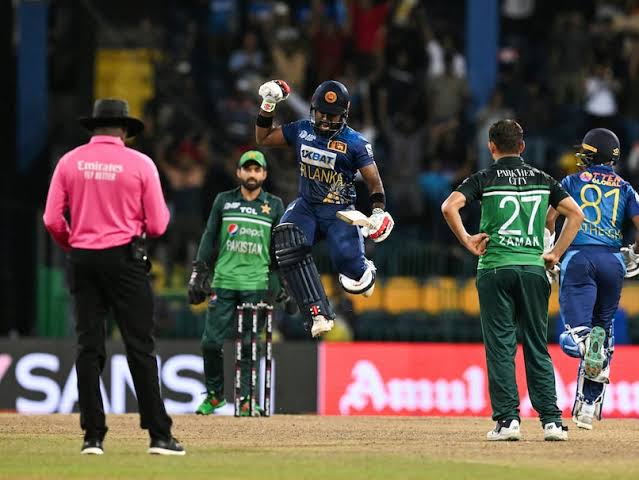Sri Lanka make Asia Cup final in a thriller

Sri Lanka made it to the Asia Cup final with a thrilling last-ball win against Pakistan in their Super 4 match, which was a virtual semi-final, played at the R. Premadasa Stadium on Thursday.
The supporters of the two sides were given their money’s worth and keep on their feet in the last two overs of Sri Lanka’s innings.
The foundation for the win was laid by Kusal Mendis and Sadeera Samarawickrama, who together associated in what was a match-winning third-wicket partnership of 100 runs, but only for the match to go down to the wire, as the late order batting faltered which almost handed the game to their opponents.
But one batsman who stood with confidence was Charith Asalanka who remained unbeaten on 49, holding on but unfortunately losing partners at the other end.
In fact, the game was almost lost with Sri Lanka needing eight runs in the last over but they lost a wicket in the fourth ball before Asalanka turned the tide Sri Lanka’s way by scoring the required six runs needed in the last two balls, for Sri Lanka to qualify for their 11th Asia Cup final.
Sri Lanka in their run chase of a revised target of 252 showed signs of aggression with Kusal Perera going on the rampage and looked to give confidence to the batsmen who followed.
Unfortunately, he got himself run out having hit 17 off just eight balls which comprised four boundaries.
Kusal Mendis along with Pathum Nissanka continued to torment the Pakistan bowlers helping the side to put up 50 runs on the board in 45 balls and then followed it up with their 50-run stand for the second wicket in 51 balls.
Seven runs later however, Nissanka lobbed an easy return catch to Shadab Khan having made 29 with Sri Lanka on 77 for 2.
Mendis joined by Samarawickrama kept up their reputation of being a reliable pair as they added to their solid partnerships in the World Cup qualifier encounters as they gave the Pakistan bowlers some torrid moments with their top batting display.
The pair playing with confidence posted Sri Lanka’s 100 runs on the board in 103 balls and then their 50-run stand for the third wicket in 42 balls before Mendis raced to his half-ton in 47 balls and Sri Lanka’s 150 runs came in 153 runs.
But Samarawickrama was unfortunate to miss out on his half-ton as he misjudged a delivery off spinner Iftikhar Ahmed ending in wicket keeper Mohammad Rizwan whipping off the bails as a valuable 100-run stand for the third wicket was broken with Sri Lanka’s score on 177 for 3 in the 30th over.
Mendis did not last long but featured in a brief stand of 33 runs for the fourth wicket with Charith Asalanka as he became Ahmed’s second victim having made a quick-fire 91 in 87 balls which comprised eight boundaries and a six.
Earlier the match got off to a late start at 5.15 p.m. due to a wet outfield and was curtailed to 45 overs with Pakistan taking first lease of the wicket after skipper Babar Azam won the toss.
They were bogged down in the first five overs after right arm pace Pramod Madushan, who came in for this match, started with a maiden over.
Openers Abdullah Shafique and Fakhar Zaman had difficulty in reading the bowling which ended in Zaman falling victim to Madushan in his third over and the fifth of the innings, clean bowled for four in 11 balls with the score on nine.
But Shafique, who is noted as a specialist in dealing with spinners, joined by skipper Azam steadied the innings as they took things under control and the pair succeeded in putting up Pakistan’s 50 runs on the board in 67 balls which was followed by the 50-run stand.
The partnership ended 14 runs later with the dismissal of Azam having added 64 runs with Pakistan on 73 for 2 in the 16th over.
They lost three quick wickets for the addition of 57 runs which included Shafique’s, who made 52 in 69 balls, that included three boundaries and two sixes, as they slid to 130 for 5 in the 28th over.
The rain that followed saw another three overs being lost with the innings being restricted to 42 overs a side.
But the Sri Lankan bowlers failed to keep up the momentum as they gave Mohammad Rizwan and Mohammad Nawaz the loophole that proved to be crucial and gave the advantage to Pakistan.
The pair sent the bowlers on a leather hunt and kept the scoreboard moving and accumulated their runs with ease and will.
Rizwan raced to his half-ton in 48 balls and then the partnership of 50 runs came to in just 42 balls, in contrast to the slow scoring in the early stages of the innings.
The pair succeeded in putting up Pakistan’s 200 runs on the board in 224 balls and their 100-run stand for the sixth wicket in just 75 balls before they were separated with the dismissal of Ahmed who made 47 in 40 balls with four boundaries and two and added 108 runs for the sixth wicket in 77 balls.
Pakistan’s score from 150 to 250 runs came in just 64 balls which bolstered their total and helped them end with a challenging score of 252 for 7.




